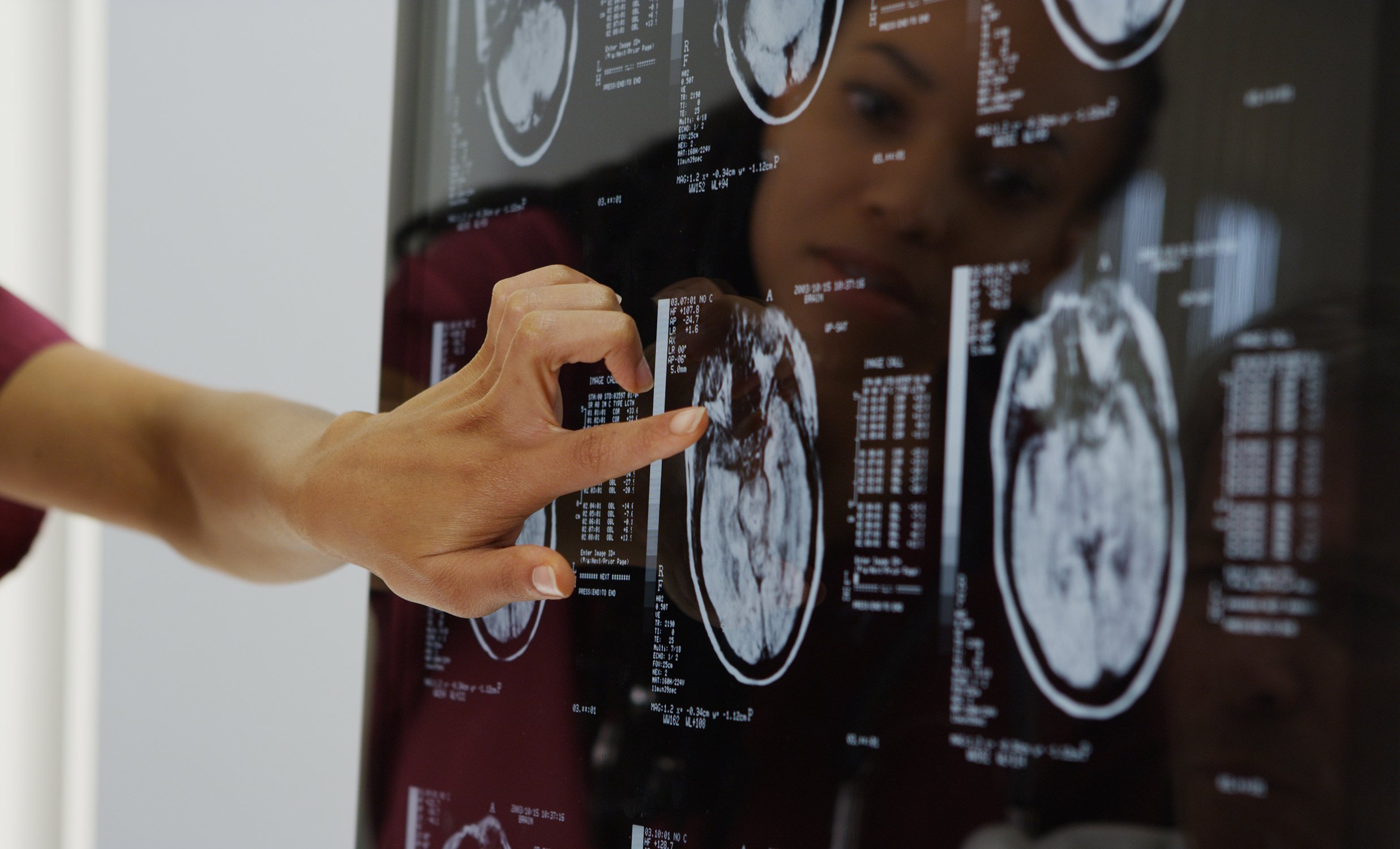
Behavioral Neuroscience
The concentration in behavioral neuroscience is designed for students with a focused interest in the biological bases of behavior and thought.
The concentration is well suited for students that are contemplating professional or research careers in medicine, pharmaceuticals, veterinarian medicine, animal science, neurology, and neuroscience. Yet, the courses in the concentration are open to all psychology majors and even to other majors. Because BN concentrators have additional laboratory requirements beyond those needed for the psychology major, at graduation all students who complete the BN track receive a Bachelors of Science (BS) degree and a note on their transcript that they successfully completed the BN concentration.
FAQs
Neuroscience is an extremely large discipline that encompasses an extremely wide variety of scientists and scientific interests. However, all neuroscientists are interested in the brain and how the brain works. Some neuroscientists are only interested on learning about the basic physiology of the brain and of brain tissue. These neuroscientists may be interested in such questions as: What cellular processes enable neurons to communicate with each other via neurotransmitters? But behavioral neuroscientists are interested in the relationship between the physiological processes that occur in the brain and the behavior of an organism. The Behavioral Neuroscientist is likely to be interested in the answer to the question: What types of altered communication between neurons is responsible for the dramatic changes in behavior and cognition that are observed in people with bipolar depression? This focus on the behavior of the entire organism is what is distinctive about behavioral neuroscience.
Yes.
The facts are that neuroscience or biopsychology concentrations are among the most demanding undergraduate programs offered. There is a significant degree of overlap between the requirements for the BN concentration and the courses that comprise most pre-med programs. It is very likely that no matter how capable a student you may be you will be challenged at some point in the curricullum. Before you decide to tackle the BN concentration you should discuss your plans with your undergraduate advisor and your BN advisor.
Just as every psychology must do, each student in the BN concentration must complete an empirical research project during their senior year. The topic of this thesis should be related to a topic in behavioral neuroscience and must be approved in advance by the BN advisor. The BN concentration has been designed to equip you with all the skills you should require to complete the thesis. Very often your thesis project may develop from collaborative projects that you began with one of the faculty. Many students presented their thesis at conferences and some have even published their thesis. Here are just a few of the recent BN thesis projects that have been completed by seniors:
- Children’s Event Related Potentials and their Relationship with Computer Abilities.
- Acute Aluminum Toxicity in Advanced Aged Mice
- The Effects of Lead Exposure on Rat performance in an Eight-arm Radial Maze and Possible Implications for ADHD in Humans.
- Anxiety and EEG: Using a Brain Atlas to Document Anxiety in the Temporal Lobes.
- The Effects of Sodium Salicylate on Sexual Arousal in Adult Male Mice (Mus domesticus).
- The Effects of Anandamide on the Ultrasonic Vocalizations of 10 Day-old Infant Mice.
- The Effects of Medication on ERP Characteristics for Attention Deficit Disorder Individuals.
- The Effects of Prenatal Cocaine on Physical and Social Development of Infant Mice.
- The Effects of Antioxidants on Recovery from Excitotoxin Induced Brain Injury: Hippocampal Lesions and Spatial Learning in Mice.
The answer is absolutely yes!
While the concentration requires careful planning and course sequencing, there is ample opportunity to complete all the course requirement for graduation and for the BN concentration in four years. Some students take summer courses to accelerate their progress through the major or allow them greater flexibility in course selection during the regular school year. To insure that you are on track you should consult with your faculty advisor and with the faculty BN advisor sometime prior to the spring semester of your second year.
The BN concentration is offered through the psychology department, so you must major in psychology to obtain the B.S. in BN. However, if you decide to major in another discipline, you may still enroll in BN courses. In fact, just as we encourage students in the BN concentration to sample from a wide selection of course electives, we encourage other majors to sample from the BN courses.
Yes.
Students in the concentration are encouraged to spend at least one summer either in an internship or conducting research. There is a small summer research program at WC and similar opportunities for our students at other institutions are available. These opportunities are usually very competitive, but the rewards can be exceptional. In just the last three years, students have obtained summer internship and/or research positions at the National Institutes of Mental Health (NIMH), the National Institute of Drug Abuse (NIDA), the University of Maryland, and the University of South Carolina.
Three faculty in the psychology department teach the majority of required psychology courses in the BN concentration. These faculty are Dr. Gibson (BN Advisor), Dr. Weil, and Dr. Kochli. You can learn more about them and more about their research interests by visiting the faculty page.
Plenty!
Clinical Neuropsychology, Medicine, Pharmacology, Animal Science & Veterinary Science, Neuroscience, and many others.
Careers in most of the fields listed above require a post-graduate (M.S., Ph.D., Psy.D., or M.D.) degree. However, many many entry level positions in medical and or pharmaceutical research are available to individuals with a B.S. degree. With your liberal arts background you may also be interested in a career as a science journalist!
Follow these links to learn more about the field of neuroscience:
Follow this link for more information about WC and the admission process.
Meet Your Professors

Dr. Cindy Gibson
Associate Professor of PsychologyPSY 111. General Psychology I
PSY 210. Biopsychology
PSY 309. Statistics and Research Design II
PSY 317. Principles of Sensation and Perception
PSY 410. Neuroscience Research Methods
Meet Prof. Gibson
Dr. Audrey Weil
Assistant Professor of PsychologyPSY 111. General Psychology I
PSY 205. Drugs and Behavior
PSY 309. Statistics and Research Design II
PSY 316. Cognitive Neuroscience
PSY 410. Neuroscience Research
Meet Prof. Weil
Dr. Dan Kochli
Assistant Professor of PsychologyPSY 111. General Psychology I
PSY 210. Biopsychology
PSY 305. Psychopharmacology
PSY 313. Learning and Applied Behavioral Analysis
Meet Prof. KochliConcentration Requirements
Students need to have an understanding of basic biological and chemical science in order to have greater context for evaluating psychological phenomena. Students must take all of the following courses:
- BIO 111 and 112. General Biology
An introduction to living systems. Topics studied include biomolecules, cell structure and function, metabolism, genetics, molecular biology, diversity of life, physiology of plants and animals, evolution, and ecology. Lectures on selected topics will be supplemented with problem-based learning opportunities as well as discussions of current events and selected papers from recent scientific literature. The laboratory complements the lecture and provides an introduction to experimentation and communication of experimental results. Students also conduct an independent research project. Opportunities to attend research presentations and visit outside research facilities are provided. - CHE 120 and 140. Chemical Principles of Organic Molecules AND Reactions of Organic
Molecules
Provides a foundation in the fundamental principles of chemical structure and reactivity of organic molecules. Key topics in CHE 120 include atomic and molecular structure, intramolecular and intermolecular forces, organic functional groups, thermochemistry, acid/base equilibria, kinetics, and basic organic reaction mechanisms. Key topics in CHE 140 include the reactivity of organic molecules, including aliphatic and aromatic hydrocarbons, their halogenated derivatives, and molecules containing heteroatoms such as oxygen, nitrogen, and sulfur, alone or those incorporated in biologically relevant molecules.
Students must complete the six core courses required for every psychology concentration. These courses cover an introduction to general psychological concepts, methodological practices in behavioral sciences, and evaluation of inferential statistics
- PSY 111 and 112. General Psychology
An introduction to the scientific study of behavior and mind, embracing all aspects of human experience. Topics include the anatomical and functional organization of the nervous system, consciousness, learning, memory, development, emotion, social interactions, psychopathology, and society and culture. This course surveys the methods and major findings of the various fields of psychology. PSY 111 introduces the student to the cognitive, neurological, and biological aspects of psychology in addition to basic research methodologies. PSY 112 covers the clinical/counseling, developmental, personality, and social aspects of psychology. - PSY 209. Statistics and Research Design I
Consideration of sampling theory, the design of experiments, and the analysis and presentation of data with emphasis on correlation, t-test, chi square, and the analysis of variance. A significant portion of the course is devoted to instruction in SPSS, a computer based statistical package. - PSY 309. Statistics and Research Design II
A survey of appropriate research designs employed in psychological research. Emphasis will be on inferential statistics such as regression, analysis of variance, and appropriate a priori and post hoc test of significance. - PSY 399. Junior Seminar
This required 2-credit course, normally taken during the second semester of the junior year, teaches foundational skills essential to psychology as a professions, such as ethics certification, writing in the discipline, and proposal development. By taking this seminar, students will have the opportunity to clarify achievement goals and develop academic and career plans. - PSY SCE. Psychology Senior Capstone Experience
Students majoring in psychology satisfy degree requirements by completing either an empirical research project or a theoretical review paper.
Students must complete both of the following laboratory courses:
- PSY 210. Biopsychology
An in-depth study of the chemistry and pharmacology of the nervous system. Laboratory exercises will emphasize the use of laboratory animal models in pharmacological research. The actions of pharmacological agents on both the central nervous system and the peripheral nervous system will be explored. Laboratory exercises emphasize the use of behavioral measures used by pharmaceutical researchers to assess dose effects, drug tolerance, withdrawal, and drug interactions. - PSY 410. Neuroscience Research Methods
This course is recommended for students who are preparing for graduate study in neuroscience or medicine and combines seminar and lab work. The topics discussed in the seminar vary from year to year (e.g., Psychopharmacology of Mood Disorders, Animal Models of Mental Illness, Traumatic Brain Injury, Cognitive & Neurological Assessment) and may be repeated with permission of the concentration advisor. During the final portion of the course, students design and conduct a pilot research project. The project should be a means for the student to hone skills (e.g., perfect a specific surgical procedure) or apply specific research techniques (e.g., neural tract-tracing, histochemistry, clinical neurological assessment, animal behavioral assessments, or topographic EEG mapping) available to students in the department laboratories for his or her senior thesis project.
Students must complete three of the following courses:
- PSY 305. Psychopharmacology
An in-depth study of the chemistry and pharmacology of the nervous system. Laboratory exercises will emphasize the use of laboratory animal models in pharmacological research. The actions of pharmacological agents on both the central nervous system and the peripheral nervous system will be explored. Laboratory exercises emphasize the use of behavioral measures used by pharmaceutical researchers to assess dose effects, drug tolerance, withdrawal, and drug interactions. - PSY310: Human Neuropsychology
This neuroscience research methods course is based on the marriage of behavioral neurology theory and clinical practice. Brain-behavior relationships in humans and the rehabilitation process involved in recovery of function are covered. In addition to learning about strokes, tumors, traumatic brain injuries and other neurological disorders, students will become familiar with a variety of neuropsychological assessment techniques and apply them to a data-driven team research project. - PSY313. Learning and Applied Behavior Analysis
Reviews of theoretical and empirical research related to classical, operant and cognitive aspects of learning. Emphasis in lectures and the laboratory will be on the use of these theoretical contributions within the discipline of Applied Behavioral Analysis. - PSY 319. Comparative Psychology
An approach to the study of behavior that includes comparisons across the wide diversity among animal species and stresses the interaction between behavioral and cognitive adaptations and the demands of the environment. The emphasis in the lab will be on the methods and skills needed for quantification and analysis of behavioral data in naturalistic and laboratory settings. - PSY 316. Cognitive Neuroscience
Cognitive neuroscience investigates the biological bases of higher order cognition and complex human behavior. Topics include the methodologies of cognitive neuroscience as well as the neural underpinnings of cognitive processes including perception, attention, memory, language, and executive function. The laboratory portion will provide opportunities to demonstrate and experience cognitive and neural phenomena - PSY 317. Sensation & Perception
A survey of the methods by which humans detect and process external stimuli and the brain pathways involved in creating meaningful perceptions out of sensory information. Special attention is directed to sensory physiology, perceptual illusions and deficits in each sensory modality, including vision, audition, olfaction, taste, and touch. Laboratory demonstrations and simulations are intended to provide concrete examples and provide a mechanism for exploring each sensory modality.
Students must complete one of the following courses:
- PSY 202. Lifespan Developmental
This course will provide a broad overview of human growth and development from infancy to old age. Changes in biological, cognitive, emotional, and social domains will be discussed at each period of the lifespan. Topics will include heredity, learning, emotional development, temperament, attachment, gender development, developmental disorders, peer relationships, families, and aging. Recent research and current issues will be highlighted. - PSY 221. Social Psychology
The course surveys the major topics and theories of social psychology, such as social perception, attitudes, altruistic behavior, aggression, attraction, social cognition, as well as applied areas of social psychology and the legal system and the social psychology of health behavior. Special emphasis is placed on original research and recent developments in the field. - PSY 233. Traditional Psychiatric Disorders
Evaluation of the etiology of various forms of behavior disorders (anxiety, mood, substance abuse, psychotic), their symptoms, and treatment. These disorders will be considered in relation to clinical theories, research, and practice. - PSY 234. Medical and Developmental Disorders
Evaluation of the etiology, symptoms, and treatment of behavior disorders within the broad areas of childhood/developmental disorders and medical/organically-induced abnormal behavior. Specific topics include disorders of personality, impulse-control, eating, sleep, sex, and neurocognition. Disorders will be considered in relation to clinical theories, research, and practice. - PSY 333. Psychological Testing
An analysis of the construction, interpretation, and application of various psychological tests and measurement tools. Personality, intelligence, vocational, achievement, and aptitude tests will be evaluated. - PSY 320. Health Psychology
An examination of the psychological effects of health behavior, physical effects of psychological experiences, and theories of health behavior. Applies social psychological perspectives to such topics as stress-related diseases, placebo effects, doctor-patient interactions, dying, and the hospital environment. Additionally, covers theories and research on preventive health behavior; adherence to medical treatment; health lifestyles; substance use and abuse; and anxiety and depression in medical illness.
Make sure you're on the right track
Review the course checklist for the Behavioral Neuroscience Concentration or visit the college catalog to learn more about the academic requirements.
Course Checklist